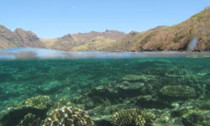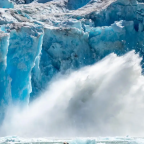
Haribon Foundation stood in solidarity with millions of people across the planet at the recent Global Climate Strike to demand immediate and concrete actions from every individual, especially the decision-makers, to provide solutions to the worsening climate emergency. As the words of 16-year-old Greta Thunberg resoundingly urges, all sectors should “act as if our house is on fire.”
Climate change is not an issue separate from biodiversity loss, as one inevitably affects the other.
For instance, the destruction, degradation and loss of forests over the past decades have dramatically increased the amount carbon dioxide in the atmosphere, thereby amplifying the greenhouse gas effect.
This phenomenon has led to increased global temperature and heat waves. Significant amount of carbon is conserved in natural forests (up to 250 MgC/ha) and can be emitted to the atmosphere as carbon-dioxide gas through deforestation, said Dr. Rodel Lasco and his research team in 2008.
Illegal, uncontrolled use and blasting of marine habitats—such as mangroves, seagrass beds and coral reefs—have also resulted in the massive decline of fish catch and degraded ecosystem services.
These benefits from ecosystems include carbon sequestration or the ability to absorb and store carbon dioxide, and protection from floods and storm surges.
In other words, efforts toward climate-change adaptation and mitigation, and the protection and conservation of biodiversity must be looked at interdependently.
The Inter-governmental Panel on Climate Change’s fifth assessment report stated that “conserving natural terrestrial, freshwater and marine ecosystems and restoring degraded ecosystems [including their genetic and species diversity] is essential for the overall goals of both the Convention on Biological Diversity [CBD] and the United National Framework Convention on Climate Change.”
In 2017, the Philippines has committed to the Paris Agreement in aiming to increase the ability of countries to respond to the impacts of climate change, and to the CBD since 1993 with the goal to conserve biological diversity, promote sustainable use of biodiversity components, and equitable sharing of benefits from using its resources.
Ecosystem services from biodiversity are key to eliminating greenhouse gases and protecting communities from disastrous climate-change impacts, such as flash floods and fatal storm surges.
Moreover, engineering innovative and renewable sources of human subsistence will also help sustain ecosystems and biodiversity for future generations.
Despite existing policies and localization efforts, the country must expedite effective implementation of concrete environmental solutions to meet the bar. Our commitments in international agreements demand double the time for our institutions to operationalize and fund conservation programs.
“We are in the midst of the sixth mass extinction,” Thunberg said. Our ecosystems and biodiversity are greatly vulnerable to climate change, making our efforts to conserve and protect the environment and everything that lives in it more relevant than ever.
Ecosystem services are our strongest hope to effectively curb the devastating effects of climate change. Our constitutional right to a balanced and healthful ecology is founded on our basic human needs such as air, water, food, shelter and clothing—all generously provided by ecosystems.
Haribon Foundation has taken up the challenge to promote a healthier Philippine biodiversity for over four decades. Among its ridge-to-reef milestones on forest restoration, marine conservation, and species protection, the group upholds the 29-year-old proposed Sustainable Forest Management Act, or the Forest Resources Bill, together with its partners.
According to the foundation, the proposed law is undoubtedly the overarching policy solution for forest ecosystem as it spotlights forest protection and reforestation as the forefront solutions to respond to the climate-wchange issue and the conservation of ecosystems and biodiversity.
“We are also calling on every decision-maker in all levels to establish, strengthen and sustain conservation efforts, explore sustainable livelihood opportunities, and continuously raise public awareness on coastal and marine management,” Haribon added.
The current administration declared that “the environment must be a top priority.” As such, every local to national government agency, policymaker, businessperson, electorate, and citizen must uphold the environmental rule of law and get actively involved—before it’s too late to save our burning house.
Source












Social Profiles